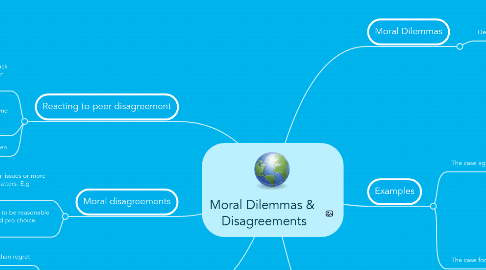
1. Reacting to peer disagreement
1.1. Epistemic peers disagree, one party might lack relevant evidence but more complicated than this...
1.2. ...arise when peers apparently share evidence . One party may lack crucial small information. One party may have special insight. Defective moral faculty, blindness?
1.3. Many of our biases are hidden
2. Moral disagreements
2.1. Relevant factual issues or more fundamental matters. E.g abortion
2.2. Most people that disagree seem to be reasonable people. E.g doctors on pr life and pro choice. Raises questions about sincerity
3. Moral residue/remainders
3.1. Supporting remorse rather than regret
3.2. Justified in making decision with idea that there is still moral residue
3.3. Involves decision where you make a moral compromise
4. Moral Dilemmas
4.1. Definition: Conflict between moral requirements
4.1.1. In Plato's republic Cephalus defines justice as telling the truth and paying one's debts. Socrates objection is returning a weapon to a mad man?
4.1.2. Sartre: student came to him with dilemma of joining resistance or stay home and look after sick mother
4.1.3. Styron's novel Sophie's Choice. SS guard offers to spare 1 child. She most choose son or daughter.
5. Examples
5.1. The case against dilemmas
5.1.1. Single sovereign moral principle (Utilitarianism/Consequentialism)
5.1.1.1. There is a right thing to do even if it isn't obvious
5.1.2. Kant's Categorical Imperative if properly implied wouldn't face any dilemmas
5.1.2.1. Deontology
5.1.3. False promises are still promises. "All sin is a desperate matter"
5.1.4. The idea that you cannot avoid a moral wrongdoing is a counterintuitive one
5.2. The case for dilemmas
5.2.1. Hierarchy of principles
5.2.2. Aquinas: "Does an erring conscience bind?" Re-educating conscience is important and then you cease to be boud
